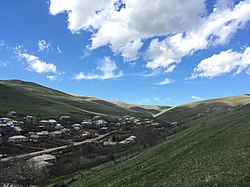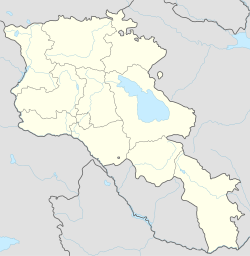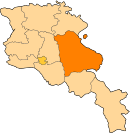Karmirgyugh
Appearance
40°19′50″N 45°11′02″E / 40.33056°N 45.18389°E
Karmirgyugh
Կարմիրգյուղ | |
|---|---|
 A view of Karmirgyugh | |
| Coordinates: 40°19′50″N 45°11′02″E / 40.33056°N 45.18389°E | |
| Country | Armenia |
| Province | Gegharkunik |
| Municipality | Gavar |
| Founded | 1831 |
| Population | |
| • Total | 4,964 |
| Time zone | UTC+4 (AMT) |
| Karmirgyugh at GEOnet Names Server | |
Karmirgyugh (Armenian: Կարմիրգյուղ, lit. 'Red Village') is a village in the Gavar Municipality of the Gegharkunik Province of Armenia.
Etymology
[edit]The village is also known as Gyukh, and was known as Kulali and Ghulali until 1940.
History
[edit]The village was founded in 1831 by emigrants from Gavar. It contains two churches with khachkars, St. Astvatsatsin and St. Grigor, and was the discovery site of a boundary stone of King Artashes, inscribed in Aramaic. There are also Urartian ruins nearby.[2]
Gallery
[edit]-
St. Astvatsatsin Church
-
Scenery around Karmirgyugh
-
St. Grigor Church
-
A view of Karmirgyugh and surrounding mountains
-
St. Grigor Church and khachkars
-
St. Astvatsatsin Church
References
[edit]- ^ Statistical Committee of Armenia. "The results of the 2011 Population Census of Armenia" (PDF).
- ^ Kiesling, Brady; Kojian, Raffi (2005). Rediscovering Armenia: Guide (2nd ed.). Yerevan: Matit Graphic Design Studio. p. 78. ISBN 99941-0-121-8.
External links
[edit]Wikimedia Commons has media related to Karmirgyugh.
- Report of the results of the 2001 Armenian Census, Statistical Committee of Armenia
- Kiesling, Brady (June 2000). Rediscovering Armenia: An Archaeological/Touristic Gazetteer and Map Set for the Historical Monuments of Armenia (PDF). Archived (PDF) from the original on 6 November 2021.









